Halloo?
 I have a peculiar problem with telephones. When ever I pick up a ringing phone, and say “hello,” there is invariably a long pause, and then the other person says, tentatively, “Hello? Is this Jim?.”
I have a peculiar problem with telephones. When ever I pick up a ringing phone, and say “hello,” there is invariably a long pause, and then the other person says, tentatively, “Hello? Is this Jim?.”
It turns out that many people assume that they are listening to a recording when I answer the phone. I finally figured it out: Most people use intonation that makes “hello” sound like a question: “Hello?” They raise the pitch at the end of the word. For some odd reason, it feels more natural to me to do the opposite. I phrase “hello” like a statement or exclamation: “Hello!” I’m not sure why I do this, but to me it feels rude, or maybe weak to phrase “hello” like a question. I don’t know, maybe it’s a guy thing, like asking for directions. I want to demonstrate my manly confidence in answering the phone without the need for questions.
Another reason for the difference is that most people use “hello?” to establish who is calling. This is part of their normal telephone conversation script which includes the following steps, in order:
- Establish who is calling (hello?)
- Greet the caller (how are you)
- Receive greeting (i am fine)
- Idle chit chat (How’s the kids? How’s the weather?)
- Leisurely cut to the chase (So, ah… the reason I am calling…)
- The chase (yada yada yada)
- Tangent into idle chit chat (So, what about them dodgers?)
- Let the person off the hook (OK, I better let you get back to work…)
- Get off the hook (Seeya!)
It’s a lovely ritual, and for the most part, I’m a big believer in rituals — but not on the phone. A telephone call does not need to be like a long lingering courtship. As an amateur telephone efficiency expert, and confirmed antisocialist, my recommended sequence of events is as follows:
- Greet the caller, request them to identify themselves and cut to the chase (Hello!)
- The Chase (yada yada yada)
- Get off the hook (Ciao!)
It occurs to me that it might be easier to get people to cut to the chase by saying something like “Hello! This is Jim. This is not a recording. You may state your business now.” But perhaps this, too, would be confusing and hurtful to my callers. I do not wish to hurt feelings. I simply wish to accomplish more in a shorter amount of time. My impatience with telephone ritual is one of many reasons why I generally prefer e-mail for effective communications.
* * *
The word “hello” is a relatively recent innovation. Before the invention of the telephone, English speaking people did not use “hello” and “hi” to greet each other. They used “good morning,” “good afternoon,” “salutations,” “greetings,” and other phrases.
The first recorded use of “hello” as a telephone greeting dates from 1883. It is a variant of “hallo” which was used as a cry of surprise, as in “hallo, what is that?” or “hallo, I have a caller on my newfangled contraption!” “Hallo” is related to the older “Halloo” which was a cry to urge on hunting dogs. That’s right. When you answer the phone you are actually saying “Sic ’em!”
At the moment, the Nokias and Samsungs of the world are hard at work packing every possible feature into the cell phone in an orgy of “convergence.” My suggestion: Incorporate the features of the (discontinued) Sony Aibo. Not only will this pacify legions of angry robotic dog owners, but we can complete the circle and use “Halloo!” to urge on our packs of scampering telephones.
The scampering telephone above was created (by me, a few years ago) in Flash, using one of Eadward Muybridge’s photo sequences of a galloping horse as a template for the animation. There are numerous examples of Muybridge’s photo sequences online, and they make an excellent shortcut for lazy animators, such as myself.


March 31st, 2006 at 5:46 am
Very interesting that telephones were so unique they required a new greeting. I find that the caller id has helped me cut that ritual script way down and go straight to the chase with “Hello Joe Blow, what’s up?” There is a moment or two of fluster as the caller adjusts to being hurtled forward in the script, but it definitely moves things along.